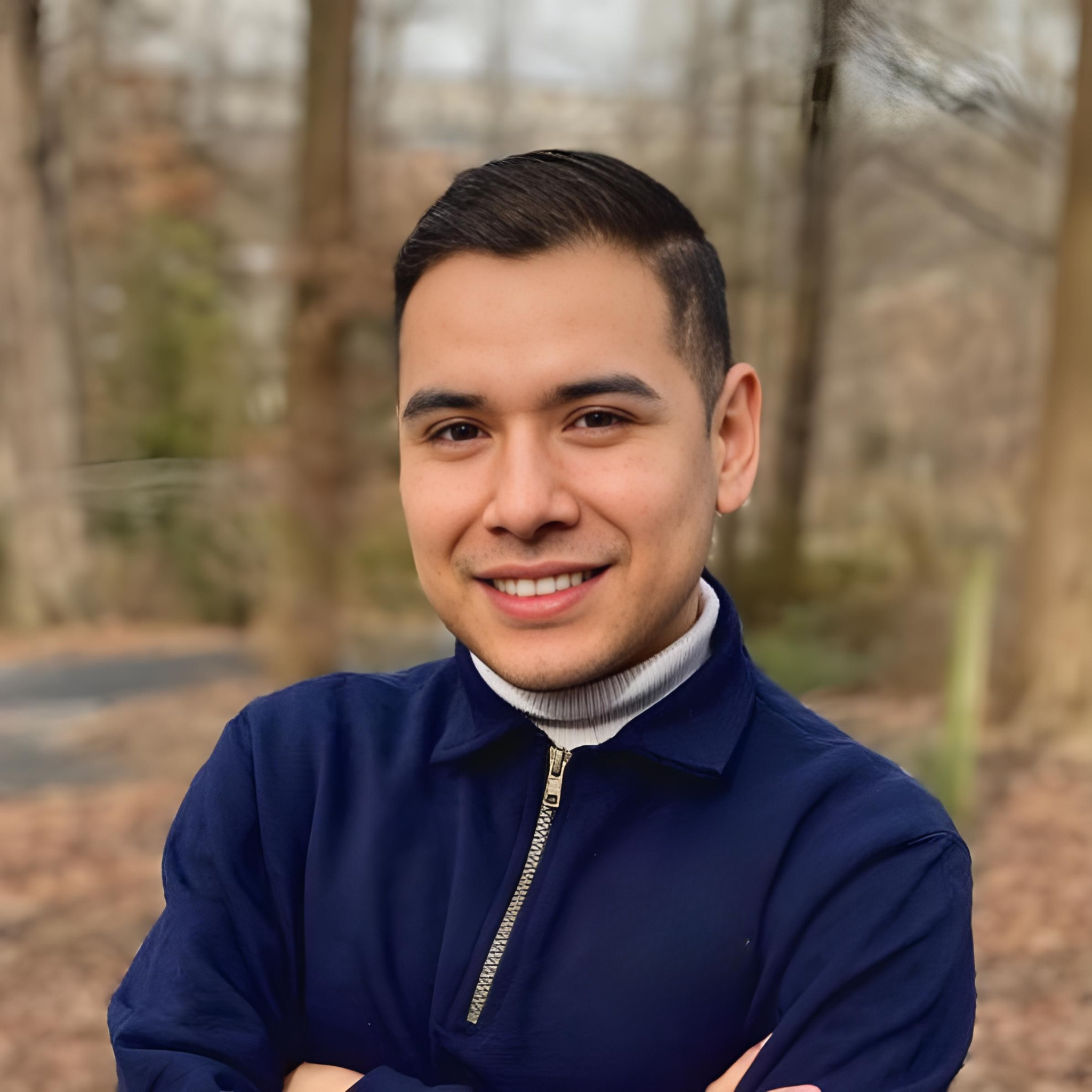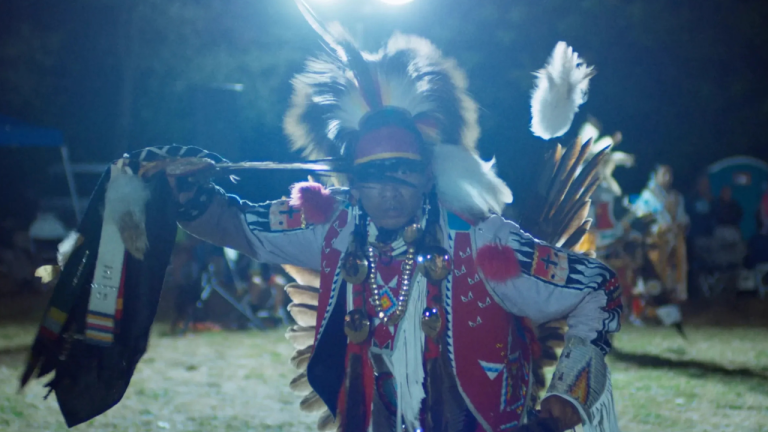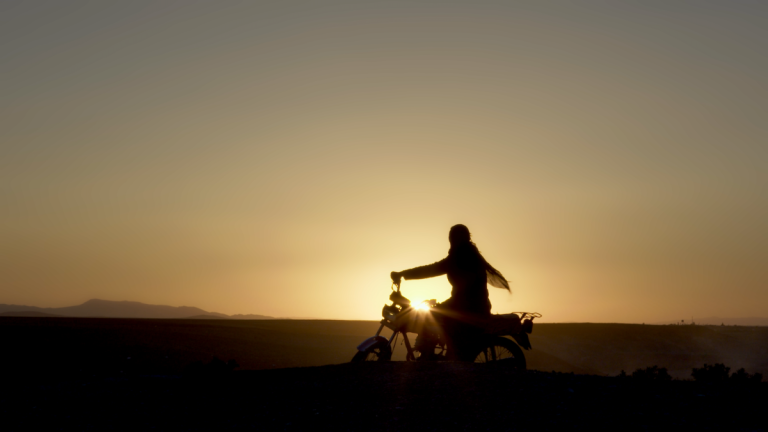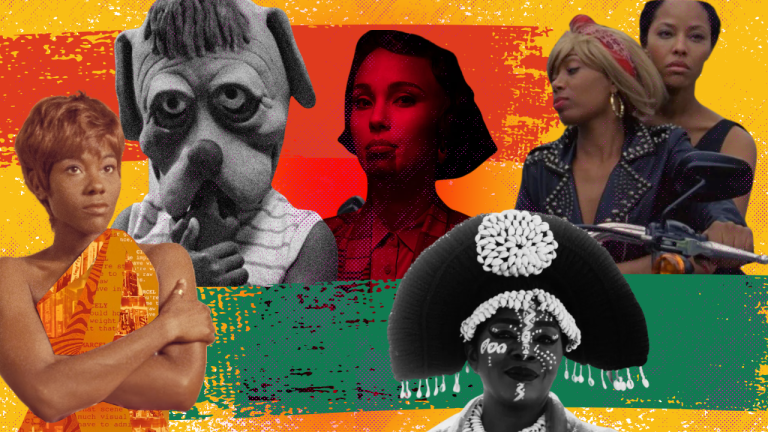
PHLAFF has recently rebranded from the Philadelphia Latino Film Festival to the Philadelphia Latino Arts & Film Festival. What new programming or experiences can audiences and filmmakers expect from this expansion?
This change comes as part of our learning through the different seasons, and the diversity and energy that creatives have brought into the space.
What we’ve seen in the past few years is that interdisciplinary work is where it’s at. Folks are combining their creative expressions, merging different disciplines, and we wanted the space to be nimble, open, and flexible.
In terms of our programming, we’ve incorporated music performances, poetry, and various dance performances throughout the year. The intention of the rebranding was simply to open the space and remain adaptable. We know we don’t do everything, and we don’t pretend to—but we’re open to all forms of expression, and we welcome them.
PHLAFF recientemente se ha renovado, pasando de ser un festival de cine a un festival de artes y cine latino. ¿Qué nuevos programas o experiencias pueden esperar el público y los cineastas con esta expansión? Nos interesa saber cómo este cambio, que incluye otras disciplinas artísticas además del cine, influirá en el impacto del festival y en los tipos de obras que se celebran.
Este cambio viene como parte de nuestro aprendizaje a lo largo de las diferentes temporadas, y gracias a la diversidad y energía que las y los creativos han traído al espacio.
Lo que hemos visto en los últimos años es que el trabajo interdisciplinario es el futuro. Las personas están combinando sus expresiones creativas, fusionando distintas disciplinas, y queríamos que el espacio fuera ágil, abierto y flexible.
En cuanto a nuestra programación, hemos incorporado presentaciones musicales, recitales de poesía y diversas actuaciones de danza a lo largo del año. La intención de este cambio de imagen fue simplemente abrir el espacio y mantenernos adaptables. Sabemos que no hacemos de todo, ni pretendemos hacerlo, pero estamos abiertos a todas las formas de expresión y las recibimos con los brazos abiertos.
PHLAFF has always aimed to present the richness and diversity of Latine/x/a/o cultures. What themes or emerging voices are standing out, and are you seeing new trends, new genres, or communities that are coming into the spotlight?
Definitely, in this moment—where we are historically and culturally—topics like immigration, displacement, and gentrification keep coming up. And it’s interesting to see how creatives show up. Now we have folks exploring those topics in comedy, in self-love, and body image.
Topics that we continue to see emerge include queer stories, coming-of-age narratives, family dynamics, separation from one's land, and the political realities our countries and nations are facing. We believe in the transformational power of film as a vehicle to connect communities and facilitate intercultural dialogue.
There are a lot of assumptions, stereotypes, and narratives fed nonstop by other sources, so we want to make sure we bring something refreshing and honest that comes directly from the source. I often say our stories need to be told—the way they need to be told—not fabricated, not made up, just real.
We’re blessed to have very gifted creatives telling these stories in compelling ways, and we’re grateful to have the opportunity to share them with Philadelphia audiences through our in-person events and virtually with audiences internationally.
PHLAFF siempre ha tenido como objetivo mostrar la riqueza y diversidad de las culturas latine/x/a/o. ¿Qué temas o voces emergentes están destacándose? ¿Están viendo nuevas tendencias, géneros o comunidades que están ganando visibilidad?
Definitivamente, en este momento —histórica y culturalmente hablando— siguen surgiendo temas como la migración, el desplazamiento y la gentrificación. Y es interesante ver cómo las y los creativos abordan estos temas. Ahora tenemos personas que los exploran a través de la comedia, el amor propio y la imagen corporal.
Otros temas que seguimos viendo emerger incluyen historias queer, relatos de crecimiento personal, dinámicas familiares, la separación de la tierra natal y las realidades políticas que enfrentan nuestros países y naciones. Creemos en el poder transformador del cine como vehículo para conectar comunidades y facilitar el diálogo intercultural.
Existen muchas suposiciones, estereotipos y narrativas que se repiten sin parar desde otros espacios, así que queremos asegurarnos de ofrecer algo refrescante y honesto que venga directamente de la fuente. Suelo decir que nuestras historias deben contarse —como deben contarse— sin ser inventadas ni manipuladas, simplemente reales.
Tenemos la bendición de contar con creativas y creativos muy talentosos que narran estas historias de forma cautivadora, y estamos agradecidos de tener la oportunidad de compartirlas con el público de Filadelfia a través de nuestros eventos presenciales y, de manera virtual, con audiencias internacionales.
Why is it more critical now than ever for both international and local Latino filmmakers to have a platform like PHLAFF to tell their own stories on their own terms? In an era of cultural erasure and rising xenophobia, spaces like PHLAFF seem more urgent than ever. What does it mean to hold space for authenticity and nuance in storytelling?
Well, it’s super important because there’s a lot of repression at the moment. We’re in a stage where what they want is to silence us, to make us afraid, to stop us from showing up for ourselves or each other.
Having the opportunity to discuss these topics openly, without judgment, among community, and also with those who want to learn, who come in with an open mind and an open heart, to share space so we can get to know each other, deconstruct some of those notions, build on commonalities, and truly learn from each other. It helps us be more informed as we navigate our communities and all the challenges we’re facing right now, and it teaches us how to lean on each other more intentionally.
¿Por qué crees que hoy es más urgente que nunca contar con una plataforma como PHLAFF para que cineastas latines, tanto locales como internacionales, puedan contar sus propias historias en sus propios términos? En un contexto de borrado cultural y creciente xenofobia, espacios como PHLAFF parecen más necesarios que nunca. ¿Qué significa para ti ofrecer un espacio donde la autenticidad y la complejidad sean bienvenidas?
Bueno, es súper importante porque en este momento hay mucha represión. Estamos en una etapa donde lo que quieren es silenciarnos, meternos miedo, impedir que nos apoyemos a nosotras, nosotros mismos y entre nosotros.
Tener la oportunidad de hablar de estos temas abiertamente, sin juicios, en comunidad, y también con quienes quieren aprender, que llegan con la mente y el corazón abiertos, para compartir el espacio, conocernos, deconstruir algunas de esas ideas, encontrar puntos en común y realmente aprender unos de otros.
Nos ayuda a estar más informados mientras navegamos nuestras comunidades y todos los retos que enfrentamos en este momento, y también nos enseña a apoyarnos mutuamente de manera más intencional.
Since PHLAFF began, it’s grown into a powerful platform for Latine/x/a/o artists, filmmakers, and storytellers. Do you feel the festival has achieved the goals it set out to reach? And as we look to the future, how do you see PHLAFF evolving to meet the new challenges and opportunities ahead?
Humbly, I can say that yes, we’re on target. We’ve stayed focused and have always reinforced our commitment to the filmmakers, the creatives, and our audiences. Every season is a learning experience.
We started as a three-day event, then moved to four days, and in 2020 we went fully virtual—we all know why. In 2021, production delays were widespread, leading to a huge number of submissions. After reviewing them, we realized we couldn’t fit all the films—over 150—into just four days, so we chose to extend to eight days. At that point, we already had a hybrid model with both virtual and in-person events.
People would call me and ask, “Hey Marángeli, this looks fabulous, but what are the two films I must see?” Because our virtual blocks had 34 films each. Clearly, that wasn’t working.
By 2023, after another analysis, we had over 200 films and thought, “Whoa.” So we decided to expand the timeline to six weeks. A lot of people think that’s crazy—and yes, it has been. But for us, the six weeks aren’t just about offering more content; it’s about truly integrating with the community.
One thing I say with a lot of pride is: we don’t have to be the protagonist. There’s no ego at play. It’s not about PHLAFF. It’s about asking: how are we a tool for artists? How are we a vehicle for filmmakers? And how are we of service to our community?
Desde su fundación, PHLAFF se ha convertido en una plataforma poderosa para artistas, cineastas y narradores latinos/x/a/o. ¿Sientes que el festival ha logrado los objetivos que se propuso al inicio? Y mirando hacia el futuro, ¿cómo ves que evolucionará PHLAFF para enfrentar los nuevos desafíos y aprovechar las oportunidades que vienen?
Con humildad, puedo decir que sí, vamos por buen camino. Nos hemos mantenido enfocados y siempre hemos reforzado nuestro compromiso con las y los cineastas, las y los creativos, y nuestras audiencias. Cada temporada es una experiencia de aprendizaje.
Empezamos como un evento de tres días, luego pasamos a cuatro días y en 2020 nos volvimos completamente virtuales — ya sabemos por qué. En 2021, hubo muchos retrasos en la producción, lo que provocó que recibiéramos una gran cantidad de inscripciones. Al revisarlas, nos dimos cuenta de que no podíamos incluir todas las películas — más de 150 — en solo cuatro días, así que decidimos ampliar a ocho días. En ese momento, ya teníamos un modelo híbrido con eventos virtuales y presenciales.
La gente me llamaba y me decía: “Oye Marángeli, esto se ve fabuloso, pero ¿cuáles son las dos películas que no me puedo perder?” Porque nuestros bloques virtuales incluían 34 películas cada uno. Claramente, eso no estaba funcionando.
Para 2023, después de otro análisis, teníamos más de 200 películas y pensamos: “¡Wow!” Así que decidimos ampliar el calendario a seis semanas. Mucha gente piensa que eso es una locura — y sí, lo ha sido. Pero para nosotras, las seis semanas no son solo para ofrecer más contenido; se trata realmente de integrarnos con la comunidad.
Algo que digo con mucho orgullo es: no tenemos que ser las protagonistas. No hay ego de por medio. No se trata de PHLAFF. Se trata de preguntarnos: ¿cómo somos una herramienta para las y los artistas? ¿Cómo somos un vehículo para las y los cineastas? ¿Y cómo estamos al servicio de nuestra comunidad?
In a time when anti-immigration rhetoric is growing louder across the U.S., how do you see PHLAFF serving as a counter-narrative—one that humanizes and celebrates Latino immigrant experiences?
Storytelling is a form of resistance. It provides continuity. It honors legacy. It lifts emerging voices in our spaces and our communities. It cements our practices, our knowledge, our rituals; its how we stay grounded. It shows how values play a key role in who we are, how we move, and how we show up.
Latinidad is more than what we eat, what we dance to, how we look, and the colors we love. It’s about how we show up for each other—that’s at the center.
And in terms of how we do our work as an alternative to dominant narratives, it’s present in everything we do. I invite you to look at the images we created for this year: our posters that say, “Spread love, not hate,” “We are the revolution,” “Power to the people.” We were very intentional about the timing of that.
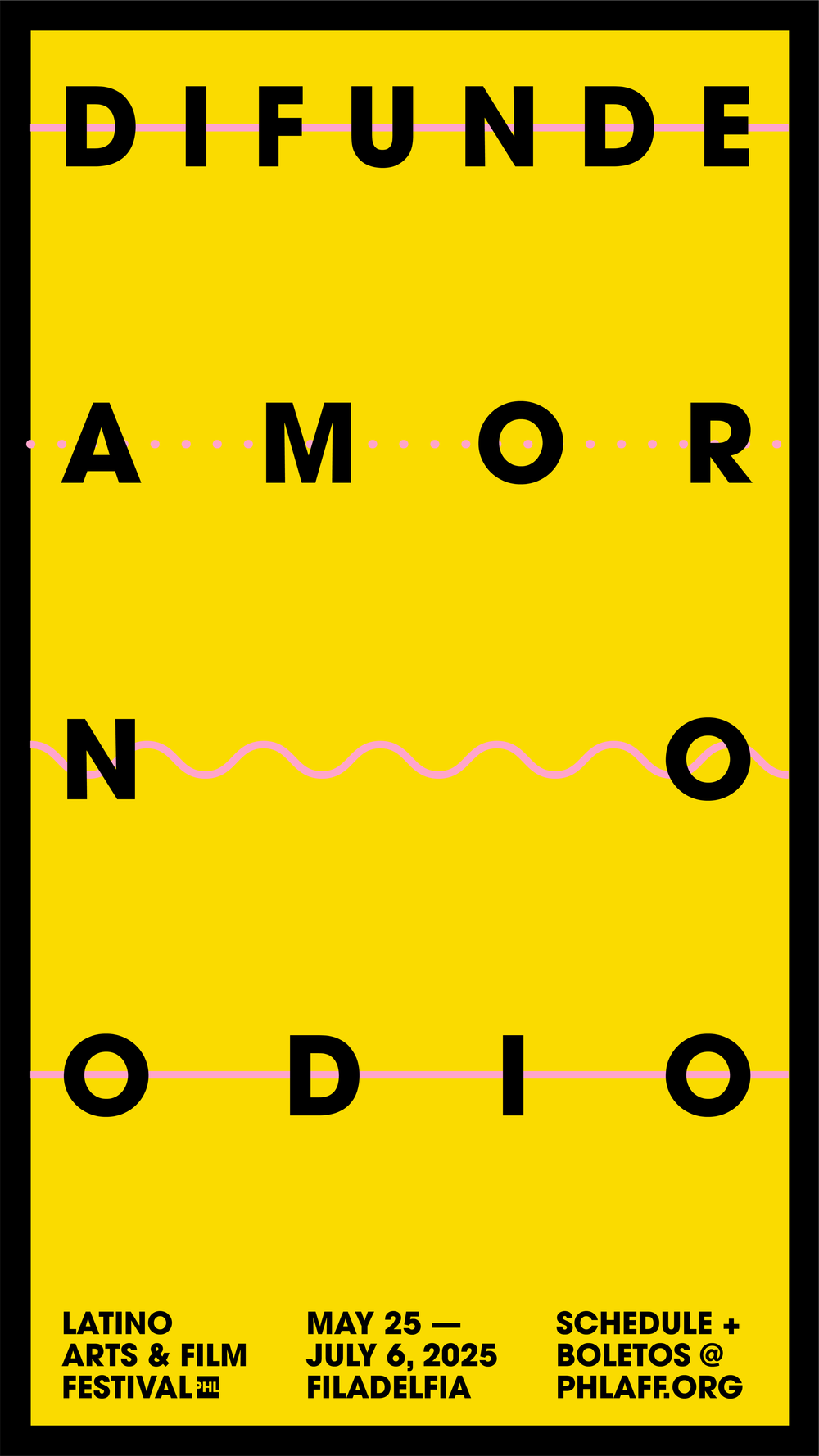
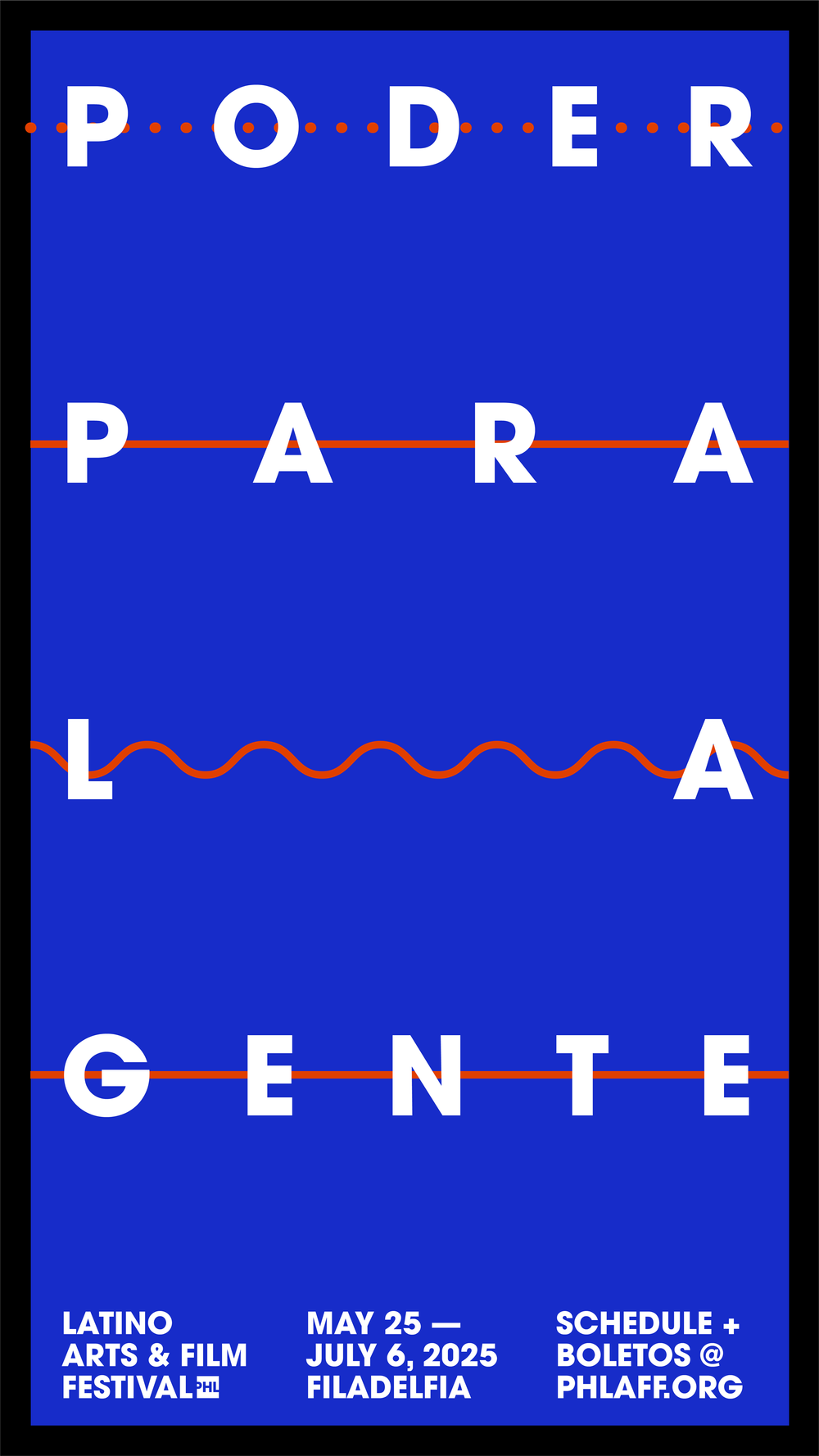
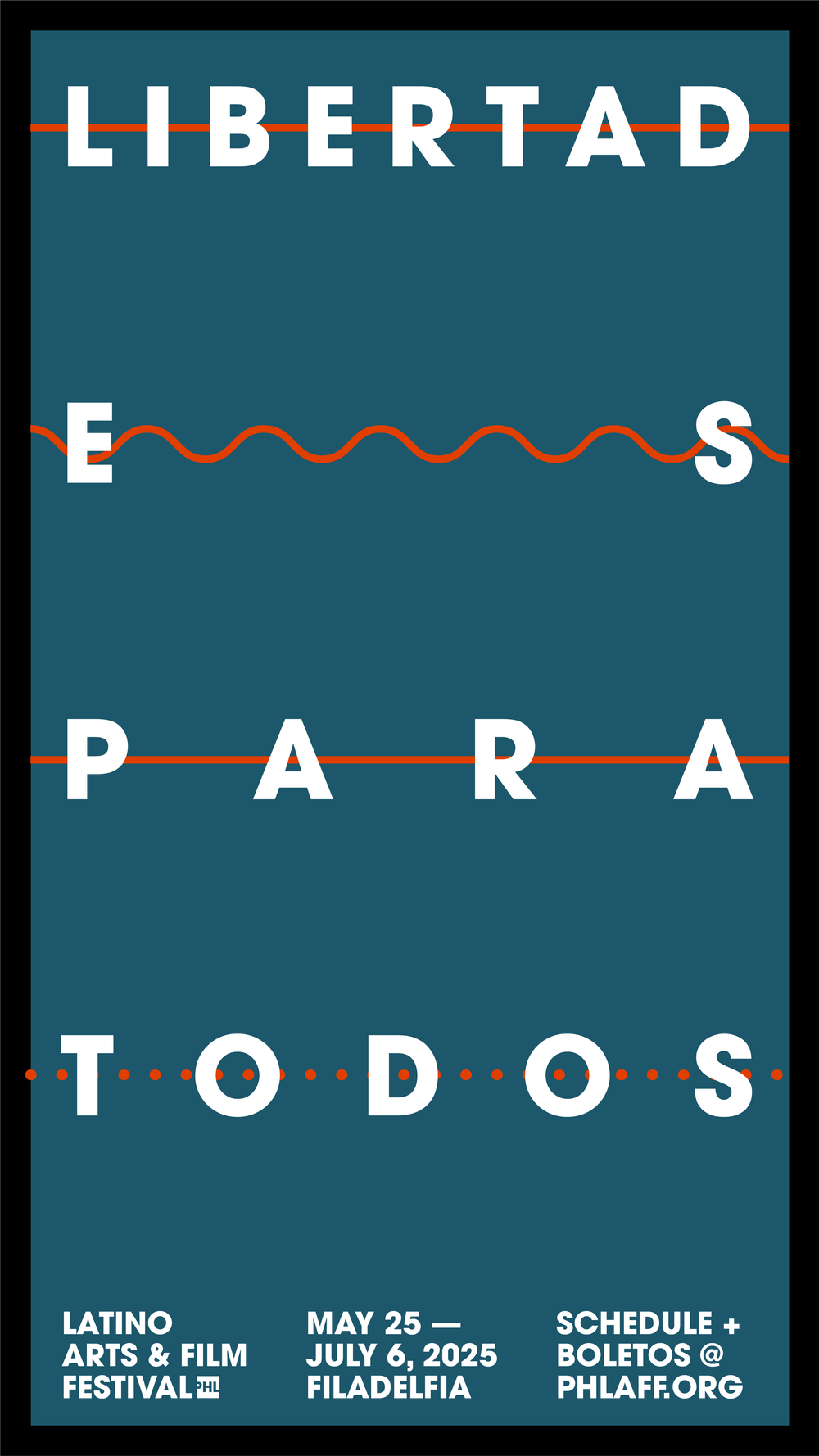
Not in a performative way, but in a way that’s honest. We don’t hide. We are here.
We’re also very thoughtful about where, how, and the accessibility of our offerings. All of our shorts are free. We want people to feel comfortable coming to different locations throughout the city. That you can bring a stroller, bring your dog, come after work. And when you’re watching online, that you can pause the film and come back to it after dinner.
One of the reasons I’ve been drawn to this work is because I fell in love with film as a child. What made me fall in love was how it opened a window to things I didn’t know, to other perspectives. It made me think, now I get it… now I understand.
It’s the same with music, it expands your view. For us, it’s a gift to be able to do this work. It’s food for the soul. It’s not only the powerful storytelling, it’s the beautiful visuals, the acting, and everything that comes into this creative process that, at its core, is driven, I believe, by love.
En un momento en que la retórica antiinmigrante se intensifica en los Estados Unidos, ¿cómo ves que PHLAFF actúe como un contrarrelato—uno que humaniza y celebra las experiencias de los inmigrantes latinos?
Contar historias es una forma de resistencia. Nos da continuidad. Honra el legado. Da visibilidad a voces emergentes en nuestros espacios y comunidades. Afirma nuestras prácticas, nuestro conocimiento, nuestros rituales; es la forma en que permanecemos con los pies en la tierra. Muestra cómo los valores juegan un papel clave en quiénes somos, cómo nos movemos y cómo nos presentamos ante el mundo.
La latinidad es más que lo que comemos, la música que bailamos, cómo nos vemos o los colores que amamos. Se trata de cómo nos apoyamos mutuamente — eso es lo central.
Y en cuanto a cómo hacemos nuestro trabajo como alternativa a las narrativas dominantes, está presente en todo lo que hacemos. Les invito a ver las imágenes que creamos para este año: nuestros carteles que dicen “Difunde amor, no odio”, “Somos la revolución”, “Poder para el pueblo”. Fuimos muy intencionales con el momento en que los lanzamos.
No de manera performativa, sino de una forma honesta. No nos escondemos. Aquí estamos.
También somos muy cuidadosas con el dónde, el cómo y la accesibilidad de nuestras propuestas. Todos nuestros cortometrajes son gratuitos. Queremos que la gente se sienta cómoda asistiendo a distintas sedes en toda la ciudad. Que puedan venir con su familia, con su perro, después del trabajo. Y cuando vean algo en línea, que puedan pausar la película y retomarla después de cenar.
Una de las razones por las que me ha atraído este trabajo es porque me enamoré del cine desde niña. Lo que me hizo enamorarme fue cómo abría una ventana a cosas que no conocía, a otras perspectivas. Me hacía pensar: ahora lo entiendo… ahora comprendo.
Pasa lo mismo con la música, amplía tu mirada. Para nosotras, es un regalo poder hacer este trabajo. Es alimento para el alma. No es solo el poder de las historias; son las imágenes hermosas, las actuaciones y todo lo que forma parte de este proceso creativo que, en el fondo, creo que está impulsado por el amor.
PHLAFF brings together work from across Latin America, the Caribbean, and the U.S. What does this kind of transnational connection mean in a climate where borders are so politicized?
As somebody who lives in the Boricua diaspora, I believe those bridges are critical. I mentioned earlier how sometimes we’re informed by what we consume, and there are assumptions, biases, and conclusions that come from that. And that isn’t only true for people from different cultures.
We do it to ourselves, too. Just because I’m Puerto Rican doesn’t mean I understand everything. We’re not a monolith. There are different experiences, different voices, different historical moments, and different realities that shape perspective and how people move through the world.
Having the opportunity to bring stories—this year we have over 180 films selected, representing 25 countries—that’s the bridge. So hopefully, this work and this programming are adding a small grain of sand to that process.
PHLAFF reúne obras de toda América Latina, el Caribe y los Estados Unidos. ¿Qué significa este tipo de conexión transnacional en un contexto donde las fronteras están tan politizadas?
Como alguien que vive en la diáspora boricua, creo que esos puentes son fundamentales. Mencioné antes cómo, a veces, estamos influenciados por lo que consumimos, y de ahí surgen suposiciones, prejuicios y conclusiones. Y eso no solo ocurre con personas de otras culturas.
También lo hacemos con nosotras y nosotros mismos. El hecho de que yo sea puertorriqueña no significa que lo entienda todo. No somos un monolito. Existen distintas experiencias, diferentes voces, momentos históricos y realidades que moldean las perspectivas y la forma en que cada persona transita por el mundo.
Tener la oportunidad de compartir historias — este año tenemos más de 180 películas seleccionadas, que representan a 25 países — ese es el puente. Así que, ojalá, este trabajo y esta programación aporten un pequeño grano de arena a ese proceso.
Right now, we’re seeing serious threats to public media. Congress has voted to cut federal funding that supports platforms that give independent artists and storytellers a voice. How do you anticipate these rollbacks affecting your community of artists?
There’s a lot at risk: our ability to connect with each other and the opportunity to bring programming to audiences.
When it comes to public media, we’ve been very intentional about collaborating with PhillyCAM, our local community media center. For several reasons. Number one: they operate public access TV channels, so we can share programming, and we’ve done exactly that.
This year, we organized a couple of sessions called Work in Progress Lab meets Dímelo. Work in Progress Lab is a more traditional format, a panel where you present your project and get feedback. Dímelo is something we created with PhillyCAM as part of PPM Fest.
When we were discussing what kind of session to do, I had the idea of Dímelo—“Tell me about it.” They asked, “Will people need a pitch deck?” But as we know, not everyone has a pitch deck, and not everyone went to film school. Right now, we’re in a space where storytellers come in all shapes and forms, and some of the best storytellers are in our neighborhoods, even if they’re not formally trained.
We see the value of public media and want to encourage engagement, so people can join and participate at different levels, in their own time, and know there’s a dedicated resource in our city that needs our support. Because public media is more important now than ever.
En este momento, estamos viendo amenazas serias contra los medios públicos—el Congreso ha votado para eliminar fondos federales que apoyan el periodismo local, el contenido educativo y las plataformas para artistas independientes. ¿Cómo crees que estos retrocesos afectarán a tu comunidad artística?
Hay mucho en riesgo: nuestra capacidad de conectarnos entre nosotros y la oportunidad de llevar programación a las audiencias.
En cuanto a los medios públicos, hemos sido muy intencionales al colaborar con PhillyCAM, nuestro centro local de medios comunitarios, por varias razones. Número uno: ellos operan canales de acceso público en televisión, así que podemos compartir programación, y eso ya lo hemos hecho.
Este año organizamos un par de sesiones llamadas Work in Progress Lab meets Dímelo. Work in Progress Lab es un formato más tradicional, un panel donde presentas tu proyecto y recibes retroalimentación. Dímelo es algo que creamos junto con PhillyCAM como parte de PPM Fest.
Cuando hablábamos de qué tipo de sesión hacer, se me ocurrió la idea de Dímelo —“Cuéntame de qué se trata.” Ellos preguntaron: “¿Las personas necesitarán un pitch deck?” Pero como sabemos, no todo el mundo tiene un pitch deck, y no todo el mundo fue a una escuela de cine. Ahora mismo estamos en un espacio donde las y los narradores vienen en todas las formas y algunos de los mejores están en nuestros propios vecindarios, aunque no tengan formación formal.
Vemos el valor de los medios públicos y queremos fomentar que más personas se involucren, que puedan sumarse y participar a diferentes niveles, en su propio tiempo, y que sepan que existe un recurso dedicado en nuestra ciudad que necesita nuestro apoyo. Porque los medios públicos son más importantes ahora que nunca.
Amid these challenges, what gives you hope? What are some ways you see artists and filmmakers continuing to persevere and thrive?
We are very resourceful, and I believe that in times of difficulty, we are the best innovators. I think we’re great at making very tasty lemonade from the lemons thrown our way.
Just recently, I was talking to one of the filmmakers in our festival this year. He stopped here on his way from China to Argentina to join us for the screening of his film.
He’s trained as a photographer, and when he told me about the process of how he shot the film, he said he didn’t use any lighting—only natural light. He didn’t have a budget, so he had to invent it all himself.
He told me about a scene set inside a cave, and he said, “That’s all paper. We just crumpled the paper, shaped it, taped it, and it looks like it’s among rocks. And it’s all paper.”
That’s just one quick example of resilience and innovation—creatives who don’t invent excuses, they get to the finish line in a way they can be proud of. It really showcases the talent, creativity, and navigational skills we have.
It’s been super refreshing to see the quality of the work being done. This year, we have films from 25 countries, featuring creators of all ages, with different levels of training, backgrounds, and perspectives. But all of them are deeply committed to telling the stories they need to tell.
A pesar de estos desafíos, ¿qué te da esperanza? ¿Cuáles son algunas formas en que ves a artistas y cineastas resistiendo—e incluso floreciendo—a pesar de los obstáculos?
Somos muy ingeniosos, y creo que en tiempos difíciles somos los mejores innovadores. Creo que somos excelentes para hacer una limonada muy rica con los limones que nos tiran.
Hace poco, estaba hablando con uno de los cineastas de nuestro festival este año. Se detuvo aquí en su viaje de China a Argentina para acompañarnos en la proyección de su película.
Él está formado como fotógrafo, y cuando me contó sobre el proceso de filmar la película, dijo que no usó ninguna iluminación, solo luz natural. No tenía presupuesto, así que tuvo que inventarlo todo él mismo.
Me habló de una escena que se desarrolla dentro de una cueva, y dijo: “Eso es todo papel. Solo arrugamos el papel, le dimos forma, lo pegamos con cinta, y parece que está entre rocas. Y todo es papel.”
Ese es solo un ejemplo rápido de resiliencia e innovación: creativos que no inventan excusas, llegan a la meta de una forma de la que pueden sentirse orgullosos. Eso realmente demuestra el talento, la creatividad y las habilidades para navegar que tenemos.
Ha sido súper refrescante ver la calidad del trabajo que se está haciendo. Este año tenemos películas de 25 países, con creadores de todas las edades, con distintos niveles de formación, antecedentes y perspectivas. Pero todos están profundamente comprometidos a contar las historias que necesitan contar.
What is one message you want to leave filmmakers with who might be considering submitting or attending for the first time?
We are always here to serve. We are committed to a process that is grounded in integrity, centered on our Latinidad and our values. We’re not perfect, but we’re here to keep growing, both individually and collectively.
We feel incredibly proud and honored to have the opportunity to do this work and to serve Philly creatives in whatever way is possible.
Por último, ¿cuál es el mensaje que te gustaría compartir con los cineastas que están considerando enviar su trabajo a PHLAFF o asistir por primera vez?
Siempre estamos aquí para servir. Estamos comprometidos con un proceso basado en la integridad, centrado en nuestra latinidad y nuestros valores. No somos perfectos, pero estamos aquí para seguir creciendo, tanto individual como colectivamente.
Nos sentimos increíblemente orgullosos y honrados de tener la oportunidad de hacer este trabajo y de apoyar a las y los creativos de Filadelfia en todo lo que sea posible.
Mark your calendars — PHLAFF turns 15 in 2026!
Get ready for a Quinceañera season that will light up Philadelphia with fresh Latine/x/o voices, unforgettable films, and a citywide celebration running from May 26 to July 5. #PHLAFF2026


.png)

